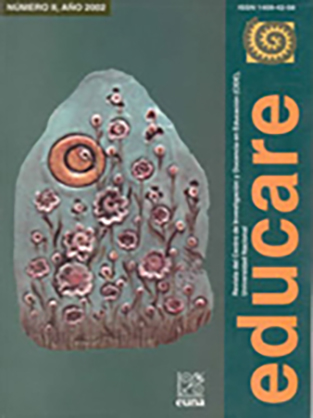Diversidad: retos para una educación inclusiva
DOI:
https://doi.org/10.15359/ree.2002-2.7Abstract
This article deals with the inclusion and participation as requisites for development. Education has a pending debt with humanity: the human diversity as a social project, and the urgency to acknowledge its content and historical meaning and the challenge the difference issue poses to education in the XXI century.
References
Banco Interamericano de Desarrollo (BID). (1994). A la búsqueda del
Siglo XXI. Nuevos caminos de desarrollo en Costa Rica.
Bordieu, P. et al. (1982). El oficio del sociólogo. México D.F.: Siglo XXI.
Delors. J. (1996). La, educación encierra un tesoro. Madrid: Santillana y UNESCO.
Kilani, M. (1989). "Introduction al' Antropologie". En Camacho, J. ( 1995). Inédito.
Lévi-Strauss, C. (1990). Antropologíoa estructural: Mito, sociedad,
humanidades. México D.F.: Siglo XXI.
Rimer, E. (1975). La, escuela ha muerto: Alternativas en materia de
educación. Barcelona: Barral Editores.
Published
How to Cite
Issue
Section
License
1. In case the submitted paper is accepted for publication, the author(s) FREELY, COSTLESS, EXCLUSIVELY AND FOR AN INDEFINITE TERM transfer copyrights and patrimonial rights to Universidad Nacional (UNA, Costa Rica). For more details check the Originality Statement and Copyright Transfer Agreement
2. REUTILIZATION RIGHTS: UNA authorizes authors to use, for any purpose (among them selfarchiving or autoarchiving) and to publish in the Internet in any electronic site, the paper´'s final version, both approved and published (post print), as long as it is done with a non commercial purpose, does not generate derivates without previous consentment and recognizes both publisher's name and authorship.
3. The submission and possible publication of the paper in the Educare Electronic Journal is ruled by the Journal’s editorial policies, the institutional rules of Universidad Nacional and the laws of the Republic of Costa Rica. Additionally, any possible difference of opinion or future dispute shall be settled in accordance with the mechanisms of Alternative Dispute Resolution and the Costa Rican Jurisdiction.
4. In all cases, it is understood that the opinions issued are those of the authors and do not necessarily reflect the position and opinion of Educare, CIDE or Universidad Nacional, Costa Rica. It is also understood that, in the exercise of academic freedom, the authors have carried out a rogorous scientific-academic process of research, reflection and argumentation thar lays within the thematic scope of interest of the Journal.
5. The papers published by Educare Electronic Journal use a Creative Commons License:














 The articles published by Educare Electronic Journal can be shared with a Creative Commons License:
The articles published by Educare Electronic Journal can be shared with a Creative Commons License: 



